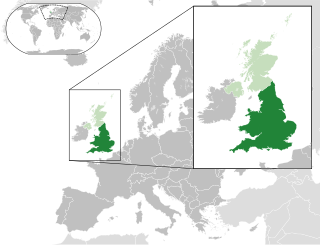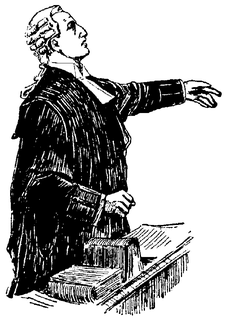
A Queen's Counsel, or King's Counsel during the reign of a king, is an eminent lawyer who is appointed by the monarch to be one of "Her Majesty's Counsel learned in the law." The term is recognised as an honorific. The position exists in some Commonwealth jurisdictions around the world, but other Commonwealth countries have either abolished the position, or re-named it to eliminate monarchical connotations, such as "Senior Counsel" or "Senior Advocate". Queen's Counsel is an office, conferred by the Crown, that is recognised by courts. Members have the privilege of sitting within the bar of court.
The Asylum and Immigration Tribunal (AIT) was a tribunal constituted in the United Kingdom with jurisdiction to hear appeals from many immigration and asylum decisions. It was created on 4 April 2005, replacing the former Immigration Appellate Authority (IAA), and fell under the administration of the Tribunals Service.
The call to the bar is a legal term of art in most common law jurisdictions where persons must be qualified to be allowed to argue in court on behalf of another party and are then said to have been "called to the bar" or to have received a "call to the bar". "The bar" is now used as a collective noun for barristers, but literally referred to the wooden barrier in old courtrooms, which separated the often crowded public area at the rear from the space near the judges reserved for those having business with the Court. Barristers would sit or stand immediately behind it, facing the judge, and could use it as a table for their briefs.

The Crown Court of England and Wales is, together with the High Court of Justice and the Court of Appeal, one of the constituent parts of the Senior Courts of England and Wales. It is the highest court of first instance in criminal cases; however, for some purposes the Crown Court is hierarchically subordinate to the High Court and its Divisional Courts.
The Immigration Appellate Authority (IAA) was an independent judicial body in the United Kingdom constituted under the Immigration Act 1971, with jurisdiction to hear appeals from many immigration and asylum decisions. Administered by the Tribunals Service, it was superseded in 2005 by the Asylum and Immigration Tribunal, which itself was superseded in 2010 by the Asylum and Immigration Chamber of the First-tier Tribunal created by the Tribunals, Courts and Enforcement Act 2007.

Barristers in England and Wales are one of the two main categories of lawyer in England and Wales, the other being solicitors. Barristers have traditionally had the role of handling cases for representation in court, both defence and prosecution.

There are various levels of judiciary in England and Wales — different types of courts have different styles of judges. They also form a strict hierarchy of importance, in line with the order of the courts in which they sit, so that judges of the Court of Appeal of England and Wales are generally given more weight than district judges sitting in county courts and magistrates' courts. At 31 March 2006 there were 1,825 judges in post in England and Wales, most of whom were circuit judges (626) or district judges (572). Some judges with United Kingdom-wide jurisdiction also sit in England and Wales, particularly Justices of the United Kingdom Supreme Court and members of the tribunals judiciary.

An admission to practice law is acquired when a lawyer receives a license to practice law. In jurisdictions with two types of lawyer, as with barristers and solicitors, barristers must gain admission to the bar whereas for solicitors there are distinct practising certificates.
The Solicitors Regulation Authority (SRA) is the regulatory body for solicitors in England and Wales.
In England and Wales, the Legal Services Ombudsman was a statutory officer that investigated allegations about the improper, ineffective or inefficient way that complaints about lawyers are handled by their respective self-regulating professional bodies. The Ombudsman is appointed by, and is answerable to, the Lord Chancellor and Secretary of State for Justice. It has been abolished under the Legal Services Act 2007
The Authorised Conveyancing Practitioners Board is the regulatory organisation and professional association for authorised conveyancers in the United Kingdom. Created in 1990 by the Courts and Legal Services Act 1990, the Practitioners Board oversees authorised conveyancers in the United Kingdom, advising the Lord Chancellor on conveyancing matters, regulating authorised conveyancers and preventing the creation of conveyancing monopolies like those that existed before the 1990 act.
The Royal Commission on Legal Services, commonly known as the Benson Commission was a Royal Commission set up by the Labour government of Harold Wilson to "examine the structure, organisation, training and regulation of the legal profession and to recommend those changes that would be desirable to the interests of justice". The Commission and its report are seen as one of the elements that lead to the passing of the Courts and Legal Services Act 1990.
A justices' clerk or clerk to the justices is an official of the magistrates' court in England and Wales whose primary role is to provide legal advice to justices of the peace.
Legal professions in England and Wales are divided between two distinct branches under the legal system, those of solicitors and barristers. Other legal professions in England and Wales include acting as a judge, as the Attorney-General, as a Solicitor-General, or as the Director of Public Prosecutions.

In the legal system of England and Wales, there is a history of involving lay people, namely people from the local community who are not required to hold any legal qualifications, in the judicial decision-making process of the courts. They are called justices of the peace or magistrates.
Annabelle Claire Bennett is the Chancellor of Bond University and a former Judge of the Federal Court of Australia.






